Embedding a Culture of Workplace Wellbeing in the Deathcare Industry
Discover how managers within the deathcare industry can help to support the mental health of staff by creating a culture of workplace wellbeing.
In our latest blog for International Womens Day 2023. We spoke to three inspirational women in the deathcare profession from across the globe.
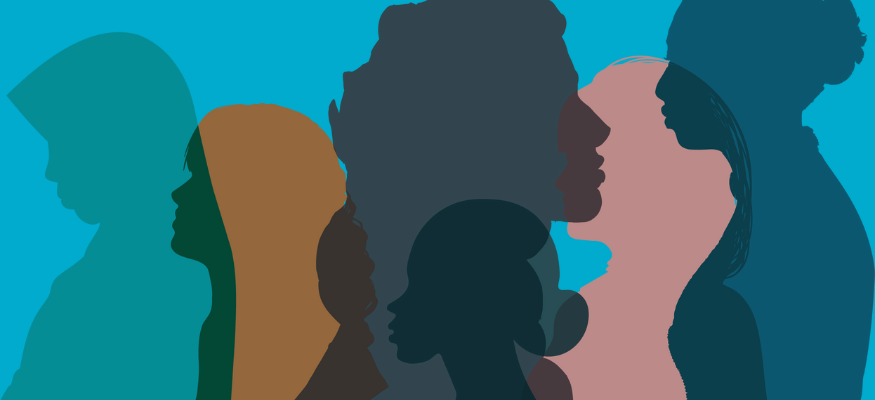
Women have played a significant role in the deathcare industry for centuries. In the past, caring for a deceased loved one typically fell to women. Often they would be responsible for caring and preparing the body of a family member for burial or cremation.
Today, deathcare could be considered as a male-dominated industry, with men typically holding positions such as funeral directors, embalmers, and cemetery workers.
More women are entering the profession
That said, over the past few decades, there has been a significant increase in the number of women pursuing careers in the deathcare arena. According to ABFSE, over 72% of graduates from mortuary school in 2022 were female, however we are still largely underrepresented in many roles and C-suite leadership positions.
Women are playing a vital role in the growing deathcare industry. As more women enter this field, take on leadership positions, and challenge the status quo, I’m sure we’ll continue to see the profession evolving and benefiting both employees and the families they serve.
To mark 2023’s International women’s Day, I took the opportunity to speak to three inspirational women in the deathcare profession from across the globe. I wanted to hear their stories, celebrate their successes, and pick their brains on tips and advice for entering what some might deem an ‘unusual’ profession.
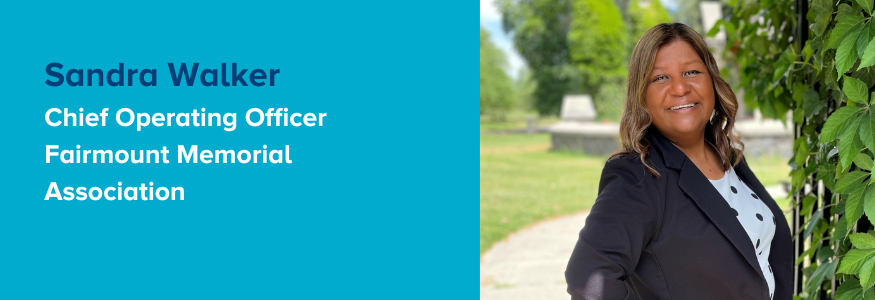
Sandra Walker is Chief Operating Officer at Fairmount Memorial Association, and one of the founding members of the Deathcare Collective. Sandra’s honesty is refreshing and her passion for the industry is unrivalled.
Describing her path into the profession as ‘unconventional’, she graduated in Criminology from Simon Fraser University in British Columbia, with the intention to pursue a lifelong dream of becoming a lawyer.
Growing up, Sandra wasn’t aware that the funeral world was a profession, as in Fiji (her birth country) the families cover a lot of the roles. Houses are funeral homes, front rooms serve as the visitation room and the family members are the funeral directors and carers. At 22, taking her first role as an office clerk in the payroll department, she had no idea of the deathcare profession she would become so passionate about.
24 years.
It was quite unconventional! While applying for law school I took a temporary job as a file clerk, then went on to be a payroll officer for the Western United States for the Lowen group. There I met Shawn Phillips and Beth Wagner who introduced me to the world of deathcare.
I was fascinated every time I talked to one of the people in the field about how their day went, and what they did. What resonated most was the passion and the love for serving their families. I was really drawn to that because I was in a corporate, very transactional role. The opportunity arose for me to move to Seattle as Office Manager/Market Administrator at Acacia Memorial Park and the Seattle Market for Alderwoods.
Personally, the power of connection. What really stands out for me is the power of connecting with people.
One of the challenges of being a woman is we're over-mentored and we lack sponsorship, so we lack the opportunity to be put into situations where our careers can actually grow. We need somebody actively advocating for us. Sometimes it’s like we have to continuously be fixed.
I undertook the Women in Leadership Certification at Gonzaga University in 2021 and learned the pitfalls that hold me back. It was an important journey of self-discovery for myself and who I am as a leader.
One of the takeaways from the course was that, as women, we spend a lot of time internally trying to perfect our jobs, whereas our male counterparts do really well with networking. So, while we're trying to get really good at perfecting our work, our male counterparts are busy networking. And networking is really how you get to know people and how you get to grow your career.
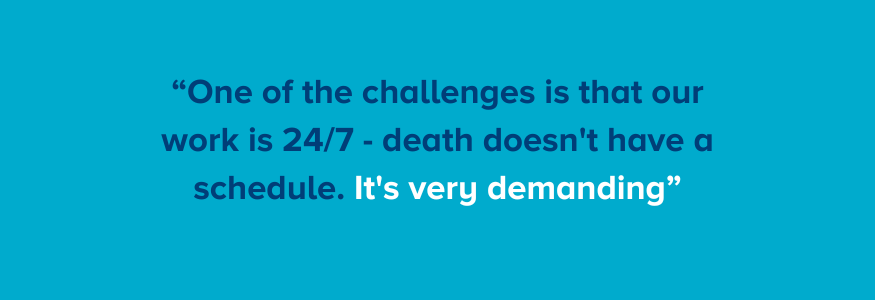
I don't know that women staying out of deathcare is necessarily true. Apparently, more students in mortuary college are female, something like 80%. I think one of the challenges is that our work is 24/7 - death doesn't have a schedule. It's a very demanding schedule, and in most households, women are the primary caregivers as well, so the challenge is how to balance the work demands and the caregiving of children.
The only thing I want to hear is that my girls are so proud to have me as their mom.
Out of my funeral directors and embalmers (I have 14 in total), with the exception of three, are all female.
Absolutely not. When I started my career, the majority of the Funeral Directors I worked with were males.
It's funny because if you think about funeral directing, it's a nurturing, soft-skill type of work. And so it’s interesting that males were always the funeral directors. I think with technology and society evolving so quickly, people aren't thinking about gender when they're looking for jobs anymore. They're not afraid to try something because they are passionate about the work or role.
My hope is to see more women in the C-suite, in the highest position in organizations making decisions. It has been said that organizations are better with women in it, and specifically women contributing to the decision-making of an organization.
Also, my desire is for us to continue humanizing the industry. We should be ourselves, and not need to conform or change who we are to validate our intelligence and our competence.
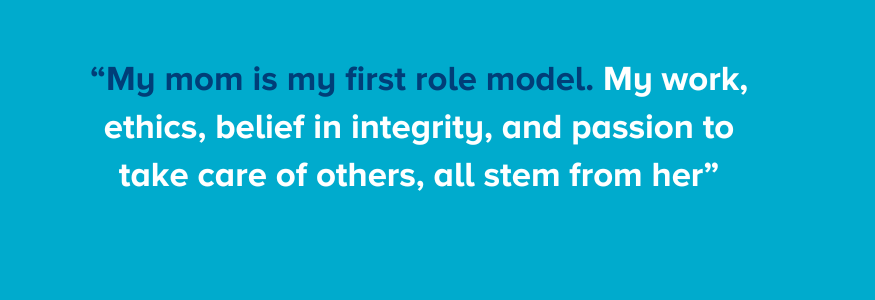
First of all, my mom is my first role model. My work, ethics, belief in integrity, and passion to take care of others, all stem from her. She taught me what servant leadership is (even though at the time I didn’t know that is what it is called).
I learned at an early age that you can work outside of the home and still be very good inside the home. She taught me that it's okay to have a career and still be a mom, and still be a wife and not have to feel guilty. She was the hardest-working woman I know. My mom passed away at the age of 52 years old in 2005.
Professionally, I would say Beth Wagner, Senior Managing Director at Service Corporation International. She was somebody who believed in me. What stood out about her was her confidence, her brilliance, and how she was unapologetic and courageous. Every skill I have today I developed by watching Beth lead.
The other person that continues to influence me is my friend Olga Phieler, my best friend. She's just brilliant, amazing. Olga is the one that introduced me to the founding members of the Deathcare Collective.
And, I cannot forget my dear friend, Caryn Knight, who passed away in 2021. Caryn taught me to be a courageous leader and not to compromise my personal beliefs for any career.
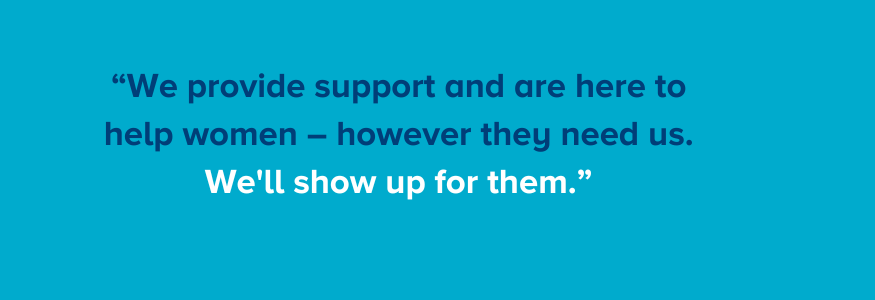
There are nine of us that started the Death Care collective in July last year. Through this, I've met a lot of amazing women that have continued to inspire and influence me. I'm just so grateful for that opportunity to create something amazing for our industry.
The creation of the Deathcare Collective started through conversations during the Covid shutdown and isolation. At the ICCFA convention in Las Vegas several of the ladies got together and it happened organically as we started to meet through Zoom in July of 2022.
As the last founding member, I’m very honored to be a part of this group. We call ourselves the Death Care Collective because we believe everyone will be better together. We provide support and are here to help women, however they need us. We'll show up for them.
We all have different needs. We're all different people, we all seek different ways of connection and help. We want to support everybody in death care, and we appreciate the support of all the men that have been supporting us and our mission.
I want to wish all the women who work tirelessly to make our profession great a Happy International Women’s Day. A special shout out to the women of Fairmount Memorial Association who are doing great things in our community of Spokane, Washington.
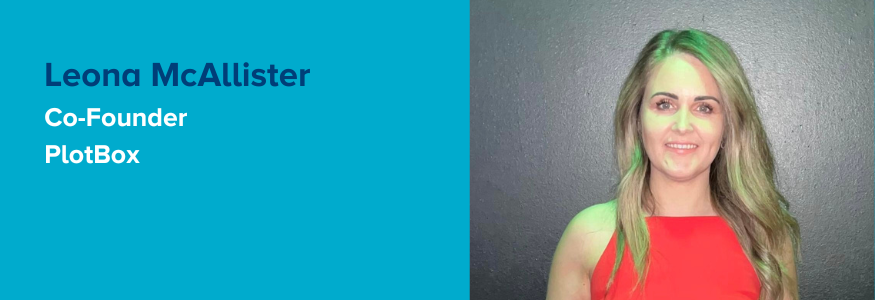
After completing a Bachelor of Arts Degree in Business Studies from The University of Ulster, Leona started her career in auditing and governance. During her maternity leave, Leona entered into the world of death tech with her husband Sean as Co-Founder of PlotBox.
Together they created a unique software brand that integrated mapping with a SaaS-based back office solution for cemeteries and crematories. They were driven by a mission to take away some of the pain around dealing with death for the bereaved and those who serve them.
Leona’s drive and tenacity has seen her travel the world, understanding how to help cemeteries and crematories operate to world-class standards, while winning many well-deserved awards along the way.
It’s just about 10 years that I would consider myself to be ‘in the industry’ but almost 14 years since the 1st cemetery survey that led to the conception of PlotBox.
The idea for PlotBox began when Sean was asked to survey our local Parish graveyard and I helped by transcribing the headstone inscriptions. Fast forward a few years, and we’d turned it into a business as a software/mapping company designed specifically for cemeteries.
I don’t really follow any specific high-profile female role models. I was lucky in my career to work with some inspiring females. I had female managers in pretty much every job I had after graduation and I’ve always admired their work ethic, commitment, and ability to juggle life with work. I’ve worked with one female manager in a past role who definitely influenced my own leadership style.
It’s great to see more young females coming into the industry, which I’ve especially noticed in the APAC region. I’ve also noticed a more general shift in attitudes to change. I think Covid hit the industry hard but it also shone a light on an industry that’s often forgotten, and that’s brought a shift in mindset and openness to change that wasn’t quite there pre-Covid.
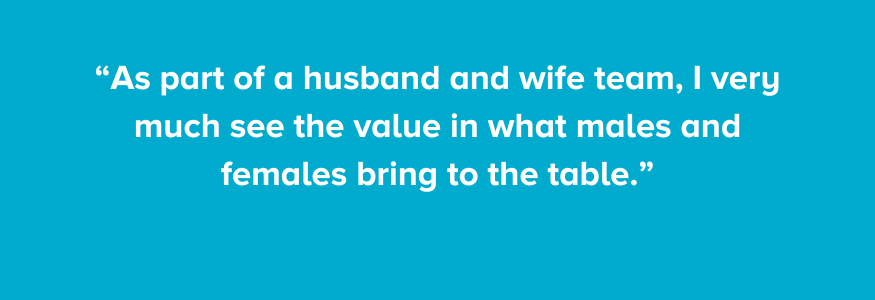
As part of a husband and wife team, I very much see the value in what males and females bring to the table. We’re not quite at 50/50 male-female split in PlotBox, currently 60/40 which is not bad for a technology and deathcare company. I’d love to see more females at a senior team level.
We are making a difference. Our mission is to take away some of the pain around dealing with death for the bereaved and those who serve them. We’re a step removed from the front-line services but we have lots of validating feedback that what we do is making a difference. Clients tell us they can serve their families better because of the technology we’ve developed and the services we offer.
For example, we’ve helped cemeteries find risks and errors preventing some families having to go through extra issues when they are already dealing with the loss of a loved one. I’m very proud that we can play a small part in helping that journey go as smoothly as possible.
People think this industry is morbid! When we say we’re heading to a cemetery, crematorium, or funeral conference, people feel so sorry for us and assume it’s depressing. I always say that, for the most part, the people we work with are genuinely lovely people. They have to do their job while working with families at the worst time in their lives. So, spending time with these folks is an absolute pleasure and the conferences are always great craic.
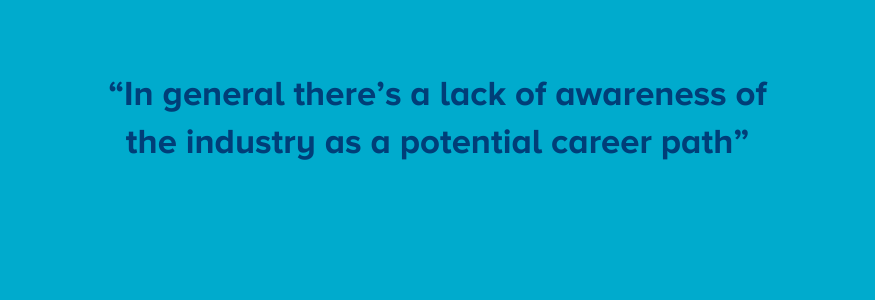
I’m not sure I’d single out females, but I think there’s a lack of awareness of the industry as a potential career path. There are so many careers within deathcare, from being on the front line dealing with the deceased and their families to memorialization, product design, marketing, sales, project management, IT etc.
Historically, people have come into the industry through friends and family rather than it being a visible option for a school leaver. In my opinion, many roles in deathcare are a vocation, but I don’t think there’s much emphasis on this for young people – we hear about teaching or midwifery and medical fields, but not deathcare.
In the right organization, there’s a strong career path for females in deathcare. We tend to see a lower staff turnover than in other industries. If you look on LinkedIn, you’ll see people spending 10 - 30 years plus in the same organization.
I’d encourage females to consider it as an option, and spend time with professionals in the industry. As much as it’s the perfect industry for some people, for others it simply won’t be. So, I’d say trust your gut feeling on it and speak to as many people in the industry as you can.
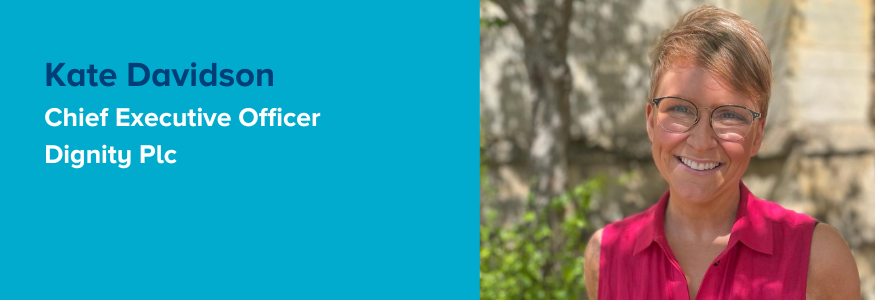
Kate is the Chief Executive Officer of Dignity Plc. Entering the deathcare industry ‘purely by accident’ Kate realized early on that this was the profession for her. She went on to break through the glass ceiling as CEO of Dignity Plc, one of the UK's most trusted Funeral Service, Pre-paid and Crematoria providers.
Kate has a true dedication, infectious positivity and passion for the deathcare profession. So it’s no surprise that she was recently seen in the New Year's Honours list. Incredibly humble about her rise to the top, she credits her success to the great mentors she’s had along the way.
16 years.
It was a kind of complete accident! I went to university and didn't know what I wanted to do. Actually, I think I was probably like every other girl at the time, I had just watched Legally Blonde at the cinema - so I went and did a law degree!
I did 3 years of study, and at the end of it (because everybody else had also done a law degree) I couldn't get a job. I was just looking for anything and managed to get a job doing admin at my local council crematory. And that was it. I literally fell into it.
Within a couple of days, I was like ‘Oh, my gosh, this is really amazing, and I really enjoy this!’’ It was so different from what I'd trained to do, but I really loved it and ‘found my space’. From there I worked my way through the Local Authority, and then moved to Dignity a couple of years after.
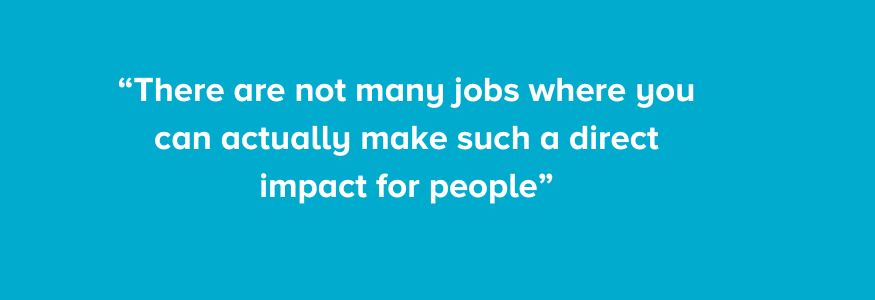
Actually, on my first day I observed a colleague looking after a family who had lost a baby and obviously, that was quite intense for your first day of working somewhere. The way that he looked after them and he really put them at ease made me think this is really different.
There are not many jobs where you can actually make such a direct impact on people. And you can do that through just really being caring and warm – that was always really important to me. I’m not a really driven, cutthroat person, that's just not my style. So, it was always a really comfortable space for people who are purpose-led in what they want to do for work.
It's just so interesting and no two days are the same. I'll never see everything if that makes sense, so that is always really exciting, and the people are awesome.
The people who work in this sector are here for more than just a job. This is more than just a career choice - it's a vocation, and they do it because they're drawn to it through their caring side. So I mean, who wouldn't want to be in that sort of environment? Every day I feel very lucky.
Yeah, mostly it is, but not as much as you would think. And certainly, when I joined the sector, it was very male-dominated. The last ten years or so it's started evening itself out. It’s great to see that we have a lot of women coming through doing roles in all different layers as well. We've also now got women in leadership which is amazing because when I started there weren’t many women in the space.
That's a really hard one because I didn't. I’ve only ever been managed by men and I’ve had amazing bosses who’ve taught me everything I know.
That tells a great story in itself. I’ve had male role models who have really championed me. Often people say ‘How did you do it and get on so well?’ I would say there's loads of stuff that's gone into it, but I've had these champions behind me who have genuinely seen potential in me.
For me, it is so important to champion people and put them into the right discussions and environments – and give them opportunities. It's not me that's done this alone, it's a complex team effort that gets you into a successful position. It’s firmly my responsibility to do the same for other people. I've been given all these amazing opportunities on this platform and the very least I can do is pass that on to as many people as I possibly can, completely regardless of gender.
There was probably a view that women would be funeral arrangers or work in admin, but actually what I've observed is that women are going into all sorts of roles. I've seen that balance in terms of access to all the jobs, all the opportunities. Women are going and grabbing it because they've got a kind, caring value-led approach, as well as being super driven and exceptional.
One of the things that I've probably learned is that within the bereavement sector, we're quite insular. When I did my MBA, I had access to all these other people in different professions and sectors. It’s about access and networking with people to bring bereavement into the career space if you like and building the profile of what we do.
It's just not the first thing you think about for a career. As a profession, we're not particularly well publicized or understood in terms of what we do from a career perspective. I don't think it's up there and ever talked about as a really exciting career opportunity. I suppose there's work to be done on how we reach out and educate more people.
It's interesting because my job is very different these days. As you work through an organization, you get further away from the front line. I would say the most rewarding part of my job was looking after people and caring for bereaved people and helping someone. I don't do that anymore, but I think about what I do on a broader level. So, hopefully I help a lot more people, when dignity does something great for the bereaved, or we are able to create an environment for our colleagues to do great things.
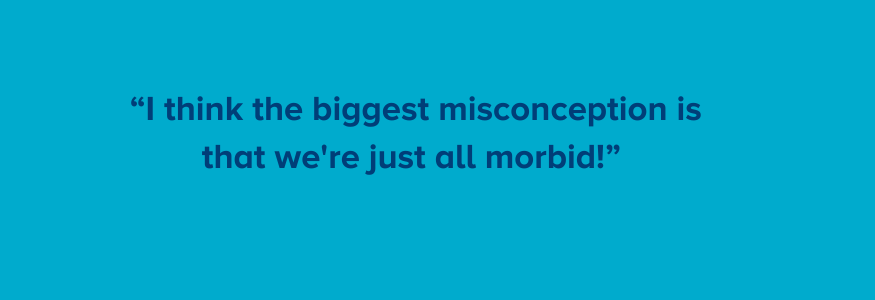
That we're really dull, that all we do is wear black, that we don't have a laugh, or that we are weird! But I get it because I probably felt the same before I joined the sector.
I think the biggest misconception is that we're just all morbid!. But you know, when people talk to me now and say “wow, you are wearing a really bright outfit” or “you are really smiley and happy and laughing all the time”. I'm like, “well, yeah, why not?”. Why shouldn't it be really positive and friendly, approachable people when you're talking about something so difficult? Surely you want people that are really warm.
For anyone who might have this on their horizon, talk to someone who's in the sector, talk to me. Getting some experience in a funeral home or a crematorium would be probably really insightful, and it would help people know what to expect because obviously, it is quite different.
There are a lot of people in the sector who are really visible on Linkedin who I think would probably feel like I do. We'd love to talk to people who are keen to get into it and share our experiences as well.
Discover how managers within the deathcare industry can help to support the mental health of staff by creating a culture of workplace wellbeing.
PlotBox has been ranked 7th among the UK's Best Workplaces™ Medium Organisations list by Great Place to Work® in 2023
We’ve seen first-hand the benefits of shared learnings that come from a commitment to world-class global deathcare development. Here are a few...